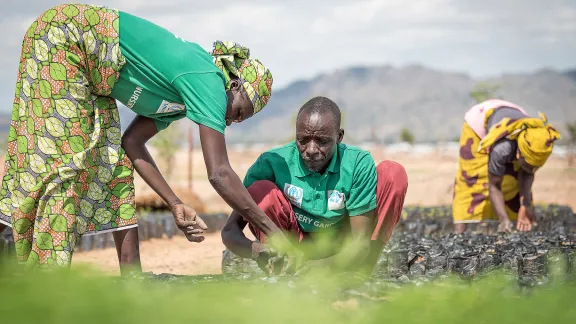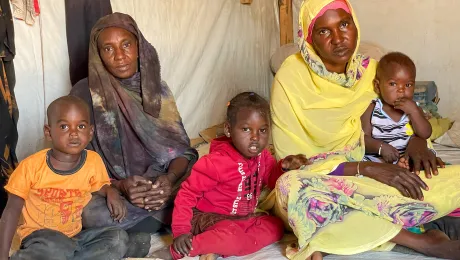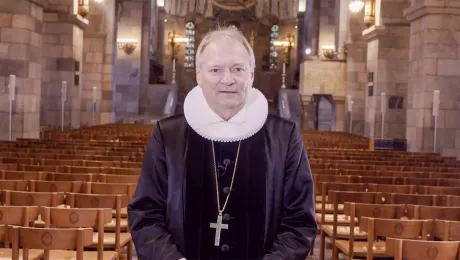
A group of refugees work in a tree nursery in the Minawao camp for Nigerian refugees. Photo: LWF/Albin Hillert
LWF sustains long-term commitment to people and environment
(LWI) - Serving the neighbour is not just about short-term emergency intervention, but also about long-term commitment, to people as well as environment.
The Minawao camp for Nigerian refugees is set at the foot of a range of rolling hills some 75 kilometres west of the Far North regional capital city of Maroua, Cameroon.

The Minawao camp for Nigerian refugees, some 30 kilometres east of the Nigerian border.
As seen from a distance, the camp is at one extreme of a large and dry, open plain. Yet this didn’t always use to be so.
”You can see around the camp here, apart from the young trees that have just been planted, that there are no trees around, so in this way, the environment is at risk,” says Nigerian refugee Luka Isaac, who serves as president of the central committee of the Nigerian refugees at Minawao.
“When we came , there were no constructions here. It was a forest. On the negative side, we cut down the trees just to prepare our food. On the positive side of it, this place has become a city now – a city like everywhere. There are schools built, and you can see that our children back home, they could not even speak in French and not English. Now they can speak both English and French,” Isaac adds.
“For us, we need to recognize that someone can be a refugee for 10, 15, even 20 years,” reflects Sheldon Munihire Bihira, protection officer and acting head of the UNHCR sub-office in Maroua. “We see that we must accept that the refugees now live where they live, and thereby affect the environment around them. So caring for the environment relates to climate change, and to engaging strategically, also to help refugees become a benefit to the community – making it easier for host communities to accept them.”
LWF projects strengthen environmental protection
Today, 20 nursery gardeners work across four tree nurseries in Minawao. Working in collaboration with the LWF, their target is to develop more than 100,000 tree plants for the year of 2019.

Trees grow in one of 20 so-called ‘green spaces’, covering a total of 150 hectares of land in Minawao.
Planted across 20 so-called ‘green spaces’, the trees will provide firewood as a source of renewable energy, material for construction, and food for animals, through a five-year harvest cycle, explains LWF environment and energy officer Kodji Ezechiel.
Branches are cut regularly and used a vines for the roofs of refugees’ houses in the camp, and the plantations help reduce environmental impact of the refugees in the area.
But as importantly, the project is one in a long line of participatory initiatives at the camp, where refugees and host communities work together to improve quality of life. Of 20 nursery gardeners, currently eleven are refugees and nine from host communities around Minawao.
The forest is not the limit
But environment projects are not limited to tree planting.
Hygiene promoter Tani Yakada, herself a refugee from Nigeria, explains how the refugees have started to separate their waste matter into degradable and non-degradable material.

Hygiene promoter Tani Yakada is one of the refugees raising awareness of the importance of separating biomass from other waste, to be recycled into new sources of energy.
While options are currently being explored for how to recycle the plastic waste at the camp, work is already well underway in taking degradable matter that would otherwise be considered waste wood, and turning it into a source of recycled energy.

At one of two charcoal centres in Minawao, Aisha Bukar closes a metal container in which biomass is burnt.
Once separated from other waste, biomass is burnt in metal containers, processed and finally transformed into charcoal briquettes, to be used as a substitute for firewood for cooking.
With the support of an environment monitor from the LWF, the full process from waste to charcoal is managed and operated by a team of refugees. Briquettes production has become a source of income for women who are promoting the production techniques and selling briquettes to local communities.

The ready-made charcoal can now serve as firewood as refugees cook their food in Minawao.
And the benefits are many – even stretching beyond mere environmental impact.
As president of the refugees, Luka Isaac acts as relay between the refugees and the many partners providing service in Minawao.
“By producing charcoal from the waste here in the camp, the women no longer have to walk long distances to find firewood – a walk that could expose them to the risk of rape and violence,” Isaac explains.
In his role, he is also part of identifying and speaking up on the specific needs the refugees have, and how they may be addressed.
“In this way, producing charcoal is not just about finding new sources of energy. It is about our safety,” he concludes.
Written by Albin Hillert.


